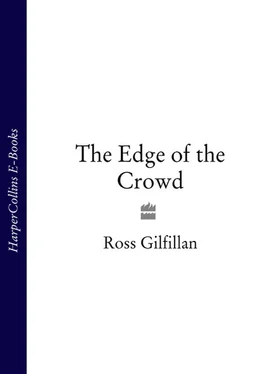Ross Gilfillan

Dedication Dedication 1 Wet Collodion 2 Over-exposure 3 ‘Sixpunny Portraits’ 4 An Imperfect Image 5 Developments 6 Illuminations 7 An Aerial View 8 High and Low 9 Positive and Negative 10 Interlude: Florence, 1850 11 The Subject is Foxed 12 A Seascape 13 Calotypes 14 High Art 15 The Final Frame Acknowledgements Previous Praise for Ross Gilfillan: Other Works Copyright About the Publisher
For my wife Lisa,
Fae, Tom and Alice
and
Dorothy Gilfillan
Cover
Title Page THE EDGE OF THE CROWD Ross Gilfillan
Dedication Dedication Dedication 1 Wet Collodion 2 Over-exposure 3 ‘Sixpunny Portraits’ 4 An Imperfect Image 5 Developments 6 Illuminations 7 An Aerial View 8 High and Low 9 Positive and Negative 10 Interlude: Florence, 1850 11 The Subject is Foxed 12 A Seascape 13 Calotypes 14 High Art 15 The Final Frame Acknowledgements Previous Praise for Ross Gilfillan: Other Works Copyright About the Publisher For my wife Lisa, Fae, Tom and Alice and Dorothy Gilfillan
1 Wet Collodion
2 Over-exposure
3 ‘Sixpunny Portraits’
4 An Imperfect Image
5 Developments
6 Illuminations
7 An Aerial View
8 High and Low
9 Positive and Negative
10 Interlude: Florence, 1850
11 The Subject is Foxed
12 A Seascape
13 Calotypes
14 High Art
15 The Final Frame
Acknowledgements
Previous Praise for Ross Gilfillan:
Other Works
Copyright
About the Publisher
Hyde Park Corner, late in the morning of July 14th, 1851, would try the patience of angels. That, anyway, is the unshakeable opinion of Cornelius Touchfarthing, as he sharply detaches sweat-fastened buttocks from the wagon’s dampened leather seat and climbs up on the chest of chemicals that has been stored behind him. Once aloft, he sways dangerously like a mast-top sailor as he searches ahead for the latest impediment to his progress and attracts the disdainful glance of a liveried footman upon a carriage and the interested attention of two sporting gentlemen in a fly. ‘What the deuce is it this time?’ asks one of them.
Touchfarthing shades his brow and squints into the middle-distance. ‘They’re letting traffic across the street,’ he reports. ‘Carriages. Lords and ladies, it looks like. And a squadron of dragoons. Well, it makes a fine picture!’
‘Picture be damned!’ says one of the passengers in the fly and takes up his newspaper while Touchfarthing, looming above, uses his hands to shape a scene beyond the crush of carriages and broughams, laden wagons and packed omnibuses. Fleshy thumbs crop pavements closely-cobbled with hats and bare heads, making them a variegated living border for a square of scarlet coats, sleekly-groomed horses and glittering carriages. ‘A very fine picture indeed!’ repeats Touchfarthing to himself.
Shaded by Touchfarthing’s corpulence is the slighter figure of John Rankin, who flicks limp reins against his knee as he chats to a lava-haired street-sweeper who has been performing ‘cat’un-wheels, ha-penny a tumble!’ between the wagon and the stationary carriage alongside. The boy doffs his cap and thanks Rankin for his penny. ‘Oh, that an’t nothing at all,’ Rankin says, jerking his thumb upwards. ‘Least, not for a cove what’s in the employ of Admiral bloody Nelson!’
‘What was that?’ Touchfarthing demands and sits down so heavily that the springs bounce and the bottles of chemicals chink loudly in the box.
‘Admiral Nelson,’ says Rankin. ‘I was just saying that Admiral Nelson lived in that there house.’
The bigger man sighs loudly as he swabs his thick neck with a damp and discoloured handkerchief. ‘Apsley House is the residence of the Duke of Wellington.’
‘That’s the fellow,’ says Rankin, and turns to wink at the boy who is already ducking under the horse’s head and causing Touchfarthing to catch his breath as he slips between the enormous wheels of a great wagon loaded with slate. The driver takes up his whip and for a dreadful moment Touchfarthing fears that the vehicle will move off and that the child will be crushed but the boy reappears among the shuffling crowds on the far pavement, biting his coin before a company of unshod ragamuffins.
Touchfarthing stares in awe at the multitude of street hawkers: the sellers of oranges and thinly cut ham sandwiches, baked potatoes and bottles of ginger beer. Then his attention is drawn towards the long lines of costermongers with their barrows and to the many hawkers of shiny commemorative medals. He considers the fact that this small army is there only to service a much greater force, whose ranks stand four and five deep by the Park rails.
Touchfarthing watches the world go by: young men with beribboned sweethearts; gangs of loudly-singing apprentices; immaculately turned-out recruiting sergeants; a sprinkling of shabby-genteel half-pay officers; two elderly widows in bombazine complaining of the heat; the many-hued faces of foreign visitors; and the walking advertisements whose signboards offer ‘cheap beds tonight’. A fascination of individuals now intrudes itself upon his attention: a small portly gentleman with glinting glasses and apoplectic colour prattling with a gaunt cleric whose frock-coat is out at the elbows; a plump and rubescent matron swiping at unruly children with a furled umbrella; and a lean man in black with green-tinted spectacles who stands against a lamppost unmoving, like a rock in a flowing stream.
‘I never saw so many people here in my life,’ Touchfarthing mutters to himself. ‘Just look at that mob,’ he says, louder this time, indicating this swell to his assistant. ‘And it’s not even a cheap shilling day …’
‘That mob’s our bread and butter,’ Rankin says. ‘It’s their sixpunny portraits what puts meat on our table.’
‘For the moment, yes,’ Touchfarthing sighs, noting the strange admixture of the crowds, the well-turned-out families lining up with dusty travellers, the quality coalescing in the crush with shopkeepers and tradesmen. ‘Perhaps, unlike myself, you don’t find it distasteful, all that … mingling?’ He is overwhelmed, perhaps appalled, by this unnatural colliding of the classes.
Rankin rolls his eyes. ‘You know what you’ve become, Mr Touchfarthing?’ he says. ‘A stunning snob, that’s what.’
Touchfarthing is too hot and too tired to rise to Rankin’s bait. They have been stopped outside Apsley House a full half hour but no one has made better headway today: crested carriage has had no more advantage over laden wagon than hansom cab over four-wheeled growler. All have been stilled under the grilling sun as drivers curse and passengers fan away flies drawn by mounting piles of horse dung.
The petrifying spell is broken by a passenger in a hansom. ‘Devil take it, I shall walk!’ he says and pays off his driver. As if this is the signal that all have awaited, the traffic begins to move again. Rankin shakes the reins and the wagon trundles forward.
Progress is slow. A piece of orange peel crushed on a front wheel takes almost a whole minute to come again to the top. But no matter how slowly they are moving, at last and up ahead vehicles can be seen turning into Hyde Park through the Prince of Wales’ Gate, where they are illuminated by sunbeams glancing off the thousands of glass panes housing the Great Exhibition.
Rankin does all the work. It is Rankin who unhitches and tethers the horse and Rankin who brings their operation to such a state of readiness that a crowd has already gathered and has begun to hinder preparations with numerous enquiries about the pricing of premium-quality souvenir photographs. A handful of mismatched dining chairs are taken from the wagon and arranged upon the grass where the subjects will sit. The camera nestles upon its tripod sufficiently distant from the Exhibition that a portion of the building may serve as a recognisable background and the angle of view has been adjusted so that the lines of abandoned carriages and other conveyances will be excluded. Even so, Rankin frowns as he emerges from under the black cloth, dissatisfied with the picture on the ground-glass screen.
Читать дальше













